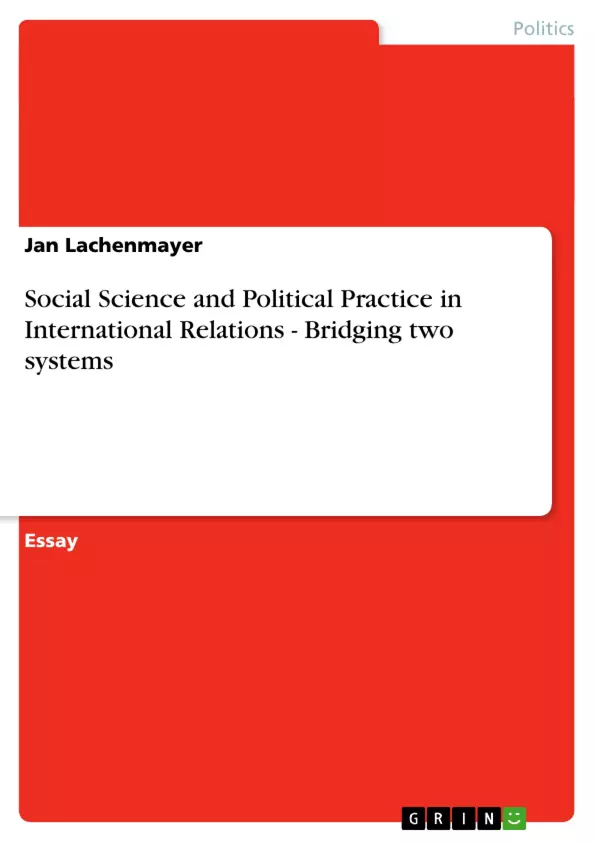International Relations in the 21st Century are more ambiguous than ever. The world can today be interpreted as a multi-polar one, where nation states, international organisations and transnational companies are in no way the only relevant entities. We live in a world of increasing complexity, where answers, if we have them at all, have a short lifespan. Buzzwords for these phenomena are globalisation, electronic revolution through the Internet, climate change, an age of terror, to name just some of them. We live in times characterized by rapid change. For political practitioners in international relations it seems to have become more difficult to act appropriately within this world situation. Increased uncertainty about the future becomes more immanent. Impacts and outcomes of policies and actions are more unpredictable, although their influence is greater then ever, because of the increased interconnection through globalisation. Cause and effect of incidents are distant in time and space. Time spans for making decisions decrease, thus time pressure becomes daily mastery. It seems that for political practitioners who face these problems support is greatly beneficial. The need is apparent and science jumps in to deliver this support. However, this cooperation has shown itself to be difficult. Scientists often complain that politicians do not follow their advice, while politicians complain that scientists are escapists who do not consider political reality. But why are scientific solution strategies often not adopted by politics?
Political Process Advising overcomes the communication barriers between science and political systems by mediating the diverging semantics and logics.
Inhaltsverzeichnis (Table of Contents)
- Political Practice in the 21st Century
- Social Science and Political Practice: An Assessment
- Political Process Advising
- The Architecture: Between Theory and Political Reality
- Analysing Situations
- The Theoretical Model
- The Practical Application: Israeli-Palestinian conflict from 2000-2002
- The role of the political process advisor
- Implementing Change Initiatives
- Analysing Situations
- Conclusion
Zielsetzung und Themenschwerpunkte (Objectives and Key Themes)
This paper explores the challenges of integrating social science into political practice, particularly in the context of international relations. The author argues that the divergent logics and semantics of the political and scientific systems create a barrier to effective communication and collaboration. The paper examines the role of political process advising as a potential solution to bridge this gap.
- The challenges of bridging the gap between social science and political practice.
- The divergent logics and semantics of the political and scientific systems.
- The role of political process advising in mediating communication between the two systems.
- The application of theoretical models to real-world political situations.
- The importance of practical evaluation and implementation in political decision-making.
Zusammenfassung der Kapitel (Chapter Summaries)
The paper begins by outlining the complexities of international relations in the 21st century and the challenges faced by political practitioners. It then examines the relationship between social science and political practice, highlighting the different logics and semantics of the two systems. Chapter 3 discusses the concept of political process advising and its potential to mediate communication between the two systems. Chapter 4 delves into the practical application of this approach, using the Israeli-Palestinian conflict as an example. The paper concludes by emphasizing the importance of bridging the gap between theory and practice in order to improve political decision-making.
Schlüsselwörter (Keywords)
The paper focuses on key concepts such as social science, political practice, international relations, political process advising, communication, logic, semantics, and the Israeli-Palestinian conflict. The paper also explores themes related to the application of theory to practice, the challenges of bridging the gap between academic and political domains, and the need for effective communication and collaboration between these domains.
Frequently Asked Questions
Why is there a gap between social science and political practice?
The gap exists because of divergent logics and semantics; scientists seek theoretical truth, while politicians operate under time pressure and practical reality.
What is "Political Process Advising"?
It is a method of mediation that bridges communication barriers by translating scientific insights into actionable political strategies.
How does globalization affect political decision-making?
Globalization increases complexity and uncertainty, making impacts of policies more unpredictable and increasing the need for scientific support.
Which real-world example is used to illustrate the theory?
The paper analyzes the Israeli-Palestinian conflict from 2000-2002 as a case study for applying theoretical models to practical political situations.
What are common complaints from scientists and politicians?
Scientists often feel ignored, while politicians criticize scientific advice as being too far removed from political reality.
- Citar trabajo
- M.A. Jan Lachenmayer (Autor), 2007, Social Science and Political Practice in International Relations - Bridging two systems, Múnich, GRIN Verlag, https://www.grin.com/document/87257



